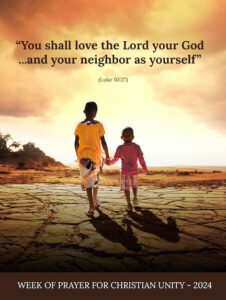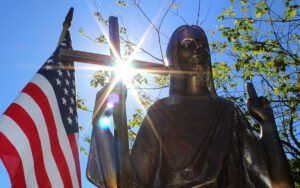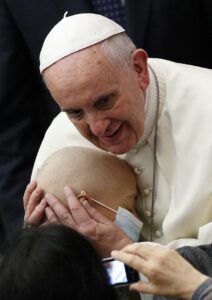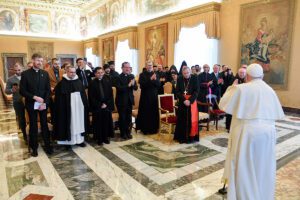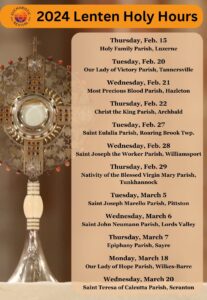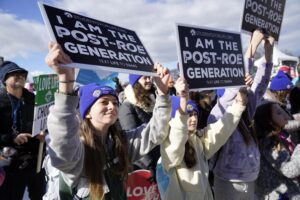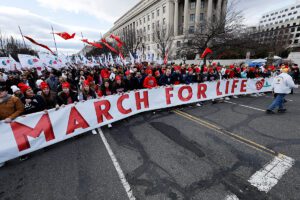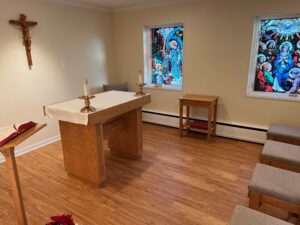VATICAN CITY (CNS) – Pornography and lust undermine and rob people from experiencing God’s gift of love, Pope Francis said.
“Sexual pleasure, which is a gift from God, is undermined by pornography: satisfaction without relationship that can generate forms of addiction,” the pope said Jan. 17 at his weekly general audience in the Paul VI Audience Hall.
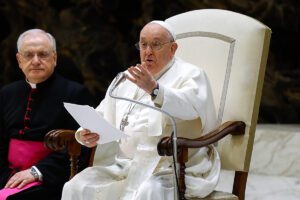
“We must defend love, love of the heart, mind and body, loving by giving oneself to another – this is the beauty of a sexual relationship,” he said.
Continuing a series of audience talks about vices and virtues, the pope reflected on the vice or “demon” of lust, which is “a kind of ‘voracity’ with regard to another person, that is, the poisoned bond that human beings have with each other, especially in the sphere of sexuality.”
“Please note,” the pope said, “in Christianity, there is no condemnation of the sexual instinct.”
The Song of Songs in the Bible, “is a wonderful poem of love between two lovers,” he said, and the human experience of falling in love is “one of the purest feelings” and “one of the most astonishing realities of existence.”
“However, this beautiful dimension of our humanity, the sexual dimension, the dimension of love, is not without its dangers,” the pope said.
The “garden” of love “is defiled by the demon of lust,” which destroys relationships and can become “a chain that deprives human beings of freedom,” he said.
“To love is to respect the other, to seek his or her happiness, to cultivate empathy for his or her feelings,” Pope Francis said.
Lust, on the other hand, poisons relationships, he said. Toxic relationships display a sense of “possession of the other, lacking respect and a sense of limits,” and where chastity has been missing.
Lust, he said, “plunders, it robs, it consumes in haste, it does not want to listen to the other but only to its own need and pleasure; lust judges every courtship a bore, it does not seek that synthesis between reason, drive and feeling that would help us to conduct existence wisely.”
A person full of lust seeks only shortcuts and adventure and “does not understand that the road to love must be traveled slowly” with patience that, “far from being synonymous with boredom, allows us to make our loving relationships happy.”
Lust is also dangerous because sexuality “has a powerful voice. It involves all the senses; it dwells both in the body and in the psyche,” he said. “This is very beautiful, but if not disciplined with patience, if not inscribed in a relationship and in a story where two individuals transform it into a loving dance, it turns into a chain that deprives human beings of freedom.”
“Winning the battle against lust, against objectifying the other, can be a lifelong endeavor. But the prize of this battle is the most important of all, because it is preserving that beauty that God wrote into his creation when he imagined love between man and woman,” he said.
Building a life together is better than going on “the hunt,” he said, and cultivating tenderness is better than “bowing to the demon of possession. True love is not possession, it is given, serving is better than conquering.”
“If there is no love,” the pope said, “life is sad, it is sad loneliness.”
In remarks made to Polish-speaking visitors after his main catechesis, Pope Francis praised the teachings of St. John Paul II, “who with great devotion educated young people in mature love.”
Visitors gathered in the Paul VI Audience Hall also were treated to a brief performance by marching band members, dancers and gymnasts from Rome’s Imperial Royal Circus.
Meanwhile, outside St. Peter’s Square, cows, horses, sheep, goats, rabbits, chickens and a donkey were resting on piles of straw, hopping or butting heads with each other as part of the annual Jan. 17 blessing to mark the feast of St. Anthony the Abbot, patron saint of animals and farmers.
Members of an Italian association of farmers and ranchers brought their animals, safely housed in large pens or enclosures, and Rome residents brought their pets, mostly dogs, for the blessing by Cardinal Mauro Gambetti, archpriest of St. Peter’s Basilica.

